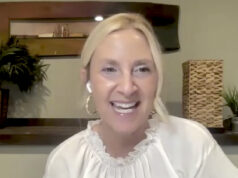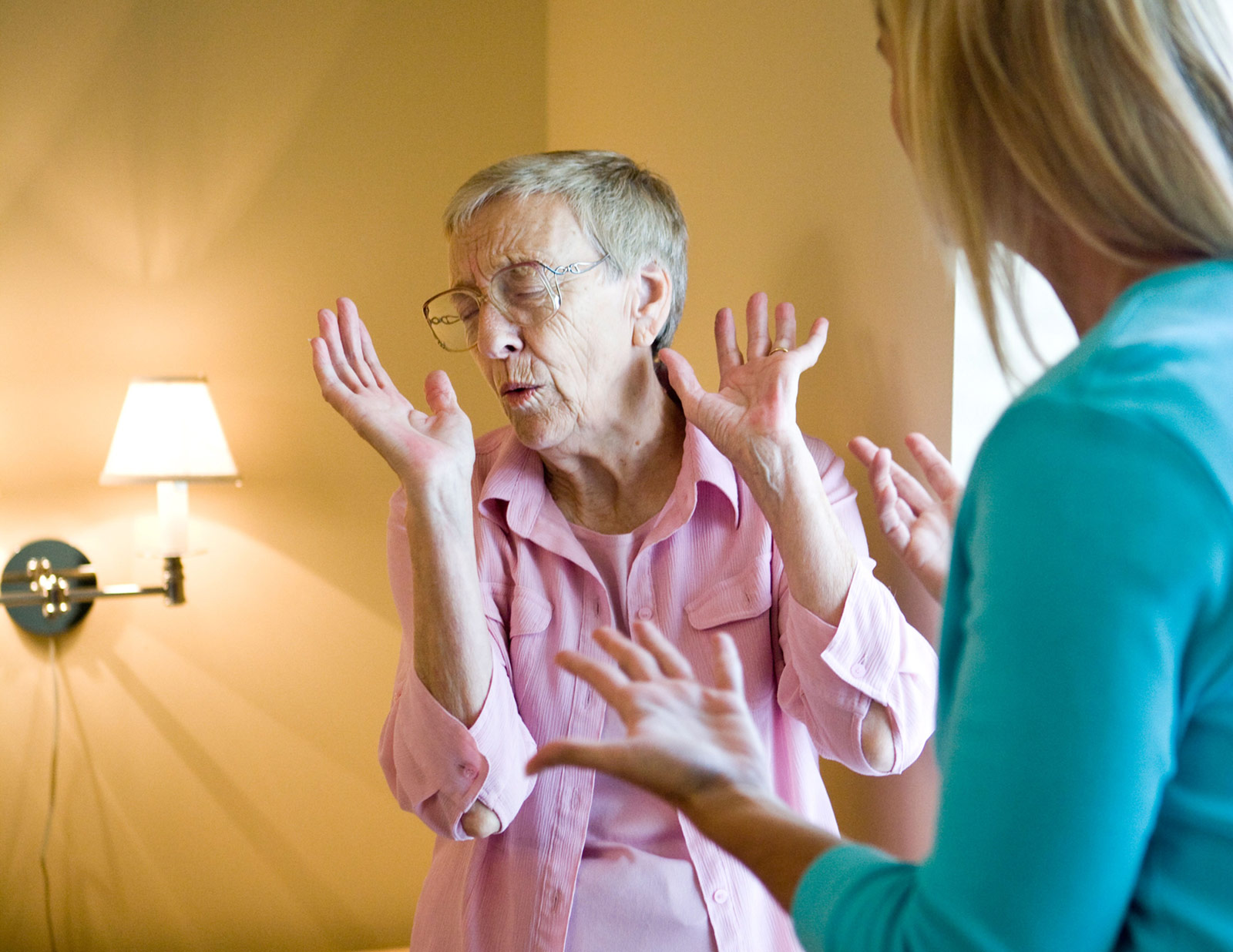Welcome back, everyone, to the Answers for Elders radio network, and we are at the bottom half of the hour and we’re talking about Alzheimer’s and dementia with Kelley Smith, vice president of Marketing and Sales for CarePartners Senior Living. And Kelley, you are so great to talk to us a little bit about what families are dealing with, what’s happening in the whole world. But you know, it’s so daunting for someone caring for a loved one with Alzheimer’s dementia. You deal with families every single day, and you have probably get a million questions — you probably hear the same questions over and over. I hope that we can use this segment to explore those options that that meet the needs of your loved one. I’m going to start out by asking: what are the most common questions that families ask?
– Well, I think a lot of times what they want to know is, they kind of want to know what a daily… what’s it gonna look like in a day for a memory care resident to be in any kind of an environment — What’s a normal day look like? You may go in for a tour and see people sleeping on the couch. I guess what at that time of day, they’d probably be doing that at home. And guess what, this is their home. So you know, don’t expect there to be parties every time you go there, because the job isn’t to entertain the residents constantly. It’s to keep them in a homelike environment, where they feel safe and secure. Activities can range from all kinds of things, from having residents help us build socks, helping us at the table, to doing somebody’s nails, to doing somebody’s beard, you know, to you know, just just sitting with them playing a card game or something that’s entertaining.
– The songs
– Singing songs, the things that you bring into the community like music, to bring music, therapies in, you bring in all these wonderful things that also enhance their life today. And so they have things to look forward to. But the most important thing that we want to get across the folks, the thing we see the most is not that mom needs to be entertained. Mom needs to feel needed. And that’s what we try to do in our community. So we try to learn as much about these people as we can. Who are you? Yeah, dementia is what mom has, we get that — who is she? Because the more we can reach her, the more we can enhance her life with us. So, okay, like we had a resident, I’ll give you an example. Family sat us down, told us all about their beautiful mother, moved into our Mill Creek community. The activity girl ran down and got all these vases and all these gorgeous flowers because she was a flower arranger. She does all of the flowers at the community.
– I love that.
– But she needs to feel needed, and you find something that connects them to what makes them feel that way. But that’s the kind of stuff people are gonna see in dementia communities. And it’s not always, like I said, it’s not always you know, you know, cupcakes and popcorn balls. It’s not always a party. But you gotta meet these folks where they’re at at the moment. It’s why the Alzheimer’s Association does a lot of stuff around something called journey training, they used to. It’s really important because you’ve got to meet the resident where they are, and that also includes care options. Is home care really the best options for your loved one, based on where they’re at in their journey with this disease? And if that’s the case, again, there’s some wonderful ones out there. Assure it is one of my favorites, but you also have to know the difference between home health and home care. Home care, these are the folks like with a little help, and some of those folks that are gonna come in and they can help mom clean, or they can make their lunch and take her somewhere and spend time with her like a friend. Then you’ve got home health where there’s actually nurses involved, and they check medications and check her, you know, check her health. Or occupational therapy, all that can be brought in. So is that appropriate for mom to keep her in her home longer? That’s a decision you guys have to make as a family based again on where she is in her journey.
– And I think there’s also a lot to be said, like if mom is at home, is that the social aspect has to be considered. And the reason why is I see, as seniors isolate, dementia can escalate quicker. We’ve seen that in the pandemic, with a lot of our seniors and older adults that have had the beginning stages, but just because they were quarantined for so long, they’ve escalated symptoms far more than what was projected. And I think that’s part of it. I mean, you’re seeing that, right, Kelley?
– Well, we we’ve said this for years. People that isolate will decline faster. It’s just a fact. And so if the family can’t keep the social part up, and again, doesn’t mean mom has to be entertained every minute of the day — there’s a social aspect that has to be there. And it’s the strangest thing. It’s kind of like you take children that are autistic and you put them in with other autistic children. They’re no longer different, they’re no longer put on display, and a lot of times they do better in classrooms with kids like them, right? And some of us on on the spectrum, we pick each other out and we become friends because there’s there’s a bond. There’s nothing about it when you communicate the way you see the world. We were at one of the communities, boxing one of the tables, and there’s a lady around there having lunch and they’re laughing and howling and talking about something that doesn’t make any sense to anybody else, but they’re having the best day of their lives because they’re together and it’s okay. It’s not a bad thing to put mom in with other dementia residents. It doesn’t mean she’s gonna decline faster, but she also has to be ready for that environment. Again, where is she in her journey?
– And I think too sometimes like husband and wife programs — we’re going to talk about your Bonded Parents program in the next segment — but I want to talk a little bit about why it’s a difficult often for a spouse. I had referred to earlier in the segment that sometimes mom wakes up and see her husband, but she remembers what her husband was like, because of Alzheimer’s, 30 years ago, 40 years ago, and she looks at this old man next to her and doesn’t recognize him. Why are you in my bed? Those are the kind of stories that just break my heart. But it’s part of that process of dementia, sometimes the mind goes sideways.
– They’re kind of interesting because one of the most common things we hear: grandma will fixate on a 16 or 17 or 18 year old grandson and he doesn’t get it, and thinks grandma’s being weird. It’s like, no, honey, do you look anything like grandpa when he was young?. I’m telling you right now that’s what it is, sweetheart. In her mind, a lot of times for these diseases, what people don’t realize, Mom will go back in time, and that’s why certain people don’t make sense. Certain things don’t make sense, because in their mind, they’re back to 32 again, and you should be about 12. So something’s not adding up here. And rarely have we ever seen where they don’t recognize the spouse. Most of the time that’s the only person they recognize as their disease progresses. But have a child that gets forgotten? You know, Mom can’t remember your name. I’m gonna tell you right now, though. I think, in here, they always know who you are. I think that’s why things get calm after a visit. I think that’s why, even if they don’t recognize you, just your presence can be good for them. Don’t give up on them just because they’ve hurt your feelings. Think about what they’re going through.
– The other thing to think about, too, is that every day could be different. One day Mom is very lucid, and the next day Dad is totally distant and despondent. And that’s just part of the process. It’s like when I see it, one day Mom is great. You know, I’d walk in and my mom was tracking 500 percent, and then other days it’s like the first thing I can tell how she’s acting, and the first thing I think of is it’s probably got a UTI, because the minute she gets a urinary tracked infection, it’s like clockwork, that dementia just went out of control. So that’s kind of the interesting thing of how all these things come into play, with the human body is pretty phenomenal. So Kelley, as far as care options, let’s say somebody now says, okay, well, how can I best bridge my loved one into a community of care such as CarePartners. What are some first steps that families should take?
– Well, the first thing they should do is start checking things out before it becomes an emergency. The problem with memory care is, by the time we get folks, there’s either been an emergency, or we’re about to have one. Make your decisions sooner. Start doing some research a little bit beforehand. Pick out communities that you like. I would pick out one or two, not just one. And the reason is, what if the time comes when mom needs to move, and they’re full? So check out a couple of places, make sure you like a couple of them. Ask the right questions. And then as far as your loved one goes, you’re gonna know, and a lot of times if you’re taking them back and forth to a doctor, you’re probably gonna get a doctor at some point who’s gonna make a recommendation, and it’s time. We’ve never had a problem with anybody really refusing to move in. You know, that’s not really a problem because most folks are either they’re ready for memory care or they’re happy that assisted living is going to be a bridge.
– Well, and I think the second piece of it is, if mom is taking care of dad, and dad has dementia or Alzheimer’s, and it’s wearing thin on mom, that’s a whole other conversation to have. There’s only so much that a spouse can do.
– That’s why we developed the Bonded Pairs, because one of the things we realized we’re probably having is that these kids were coming to mom and dad, saying we’re taking mom from you. You’re so tired, Dad, you’re just exhausted. We think we should go put Mom in this place. And Dad’s like, “I’ll be darned if you’re going to take mom from me,” and Mom doesn’t want to be taken from dad. So what we came up with was the Bonded Pairs program. And at our Mount Lake Terrace community alone, we’ve kept over fifty couples together that would have been separated. I’m very proud of that. He’s not only to save your money, but save your heartache. You know, if dad and mom can be in assisted living and she’s not going to get up the middle of the night and wander down the street, she’s fine. So why are we pushing these issues and trying to separate these folks? The biggest concern people had was being separated. So, solve the problem.
– And certainly, putting together a program that can serve the needs of both mom and dad, and they can still stay together, that’s a really important thing. In our next segment, Kelley and I are going to talk about specifically CarePartners’ community: memory care, Alzheimer’s dementia therapies, and also we’re gonna talk about the Bonded Pairs program. Please check out CarePartners, they have communities all the way from Lacey all the way up into Marysville, isn’t it?
– Linden in Bremerton, and several in Spokane. And now we’re in the Arizona market.
– So, Kelley, how do we reach you?
– CarePartnersLiving.com is the best place to start.
– Kelley and I are going to be back to finish out the hour right after this.













